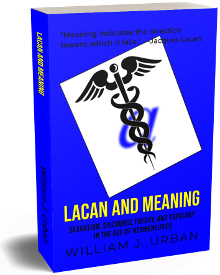LACAN AND MEANING
SEXUATION, DISCOURSE THEORY, AND TOPOLOGY IN THE AGE OF HERMENEUTICS
CHAPTER 2
WITHDRAWALS FROM MEANING
— page 33 —
Husserl’s theory of meaning emerges through his concerted effort to counter the growing influence of psychologism. This empiricist-naturalist philosophy held that only physical objects truly exist. Accordingly, non-physical phenomena like numbers, concepts, and thought in general were deemed so many effects of the physicality of the human mind. Eventually even the study of reasoning became a province of psychology, the science of the psychical acts of the mind. For Husserl, the belief that rational thought and the laws of logic are reducible to psychological states of affairs was grossly in error. It would require absurdly concluding, for instance, that to different psychic structures correspond different logics, or that logic evolves along with the human species. He illustrates his own position using his favored propositional form, the apophantic ‘Subject is Predicate;’ much to Heidegger’s chagrin, Husserl always considered this form the basic structure of thinking and language. As Husserl sees it, psychologism conflates the content of a proposition like ‘two times two is four’ with its assertion. The laws of logic do not apply to the latter, which legitimately falls to psychology, but only to the meanings making up the former. This implies that 2 × 2 = 4 is not simply a mental entity of an individual’s mind, as psychologists have it. Rather, the content of 2 × 2 = 4, its meaning, is a logical object of the subject’s thinking. Moreover, these objects possess an existence and a truth transcending the mental life of any thinker. They lie in an objective domain which not only makes the very idea of scientific knowledge possible, but is something which may itself be scientifically explored. To be sure, Husserl expressly defines logic as the science of meanings.
This notion of meaning is fruitfully contrasted with the work of Frege, a fellow logician and anti-psychologist. Frustrated by inexact talk regarding verbal expressions, Frege had proposed a distinction which has remained influential to this day. Quite simply, the definite object referred to by an expression is its meaning. Hence the meaning of ‘the discoverer of objet a’ is the French psychoanalyst named Lacan. But while ‘the theorist of the mirror stage’ has the same meaning, the two expressions are said to embody different senses. In contrast, Husserl would argue for their different meaningful contents. The contrast should be clear. While common sense follows Frege in permitting the real objects of empirical science to qualify as meanings, for Husserl meanings are ideal objects entirely devoid of any physicality. Yet an ambiguity nevertheless persists. What exactly are we to make of the ideality of meaning? Their characterization in the Logical Investigations suggests a Platonic reading. Meanings are routinely held as irreducible in their being and thus objective, transcendent, singular, unchanging, universal, sharable and standing outside time. But a closer reading makes it apparent that Husserl does not place them in a Platonic heaven. So how and from where do meanings come to embody expressions?
To answer this, logical experience must be seen as having two sides paralleling the subject-object divide, namely, the objectivating act and the logical object. These align with the two moments of Husserl’s larger theory of
« prev next »full text of Lacan and Meaning
FREE Lacanian-themed puzzles

